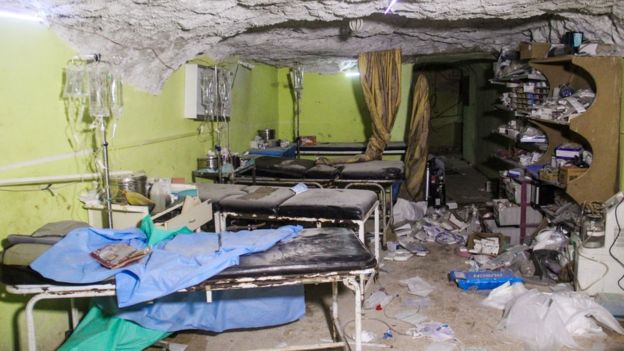Russia is objecting to a draft resolution on the chemical weapons deaths in northern Syria as the UN Security Council meets in New York.
Russian suggestions that civilians were poisoned by rebel weapons on the ground have been widely rejected.
The UK’s foreign secretary, a rebel commander and a weapons expert all said the evidence pointed to an attack by Syrian government forces.
The issue is also overshadowing an aid conference on Syria in Brussels.
Seventy donor nations are discussing aid efforts in the war-ravaged country. The UN’s Emergency Relief Coordinator, Stephen O’Brien, said details of new pledges would be released later on Wednesday.
According to UK-based monitoring group the Syrian Observatory for Human Rights, 20 children and 52 adults were killed in the chemical incident in Khan Sheikhoun, Idlib province.
Opening the Security Council meeting, UN High Representative for Disarmament Affairs Kim Won-soo said that, if confirmed, this would be biggest chemical weapons attack in Syria since Ghouta in August 2013, when hundreds of people were killed in rebel-held suburbs of Damascus.
What happened?
Footage from Khan Sheikhoun following the incident on Tuesday showed civilians, many of them children, choking and foaming at the mouth.
Witnesses say clinics treating the injured were then targeted by air strikes.
Some of the victims were treated across the border in Turkey. One woman in hospital said: “We were affected by the gas. We couldn’t stand up. I felt dizzy and sick. I suffer from shortness of breath. I couldn’t breathe.”
The World Health Organization said some of the victims had symptoms consistent with exposure to nerve agents.
A team from medical charity MSF treating victims in Idlib found patients’ symptoms were “consistent with exposure to a neurotoxic agent such as sarin gas”, the charity said in a statement.
Sonia Khush, Syria director of the charity Save the Children, said victims had travelled far and wide to get treatment, making it difficult to estimate how many had been affected.
What do the Russians say?
Damascus denies its forces launched a chemical weapons attack.
Russia, which backs Syrian President Bashar al-Assad’s government, acknowledged that Syrian planes had attacked Khan Sheikhoun.
But it said the aircraft had struck a depot producing chemical weapons, for use by militants in Iraq.
“Yesterday [Tuesday], from 11:30am to 12:30pm local time, Syrian aviation made a strike on a large terrorist ammunition depot and a concentration of military hardware in the eastern outskirts of Khan Sheikhoun town,” Russian defence ministry spokesman Igor Konoshenkov said.
“On the territory of the depot there were workshops which produced chemical warfare munitions.”
Russia, which can veto any UN Security Council resolution, said later that a draft resolution proposed at the UN was “unacceptable”.
“We do not believe it is expedient to pass a resolution on the chemical weapons attack in its present form,” said foreign ministry spokeswoman Maria Zakharova.
The resolution “pre-empts the results of an investigation and just immediately designates the guilty”, she added.
What do others say to the Russian version?
The UK ambassador to the UN, Matthew Rycroft, said in New York that President Assad had “humiliated” Russia by “making a mockery” of the peace process it had brokered with some rebel groups.
He suggested Russia was “defending the indefensible” by supporting the Syrian government in its actions.
In Brussels, UK Foreign Secretary Boris Johnson said: “All the evidence points to the Assad regime.” He called for a “thorough and urgent international investigation”.
German Foreign Minister Sigmar Gabriel condemned the “barbarism” of using chemical weapons, and said Russia should do everything to clarify what had happened as soon as possible.
Hasan Haj Ali, commander of the Free Idlib Army rebel group, told Reuters news agency: “Everyone saw the plane while it was bombing with gas.”
Local journalists say there are no military positions in the town itself but an array of broadly aligned rebel groups controlling the area surrounding it.
Critics of the Russian statement say reports of the release of gas came hours before the times stated by Mr Konoshenkov.
A chemical weapons expert, Col Hamish de Bretton-Gordon, told the BBC that the Russian version of events was “pretty fanciful”.
The idea that a nerve gas like Sarin could spread after a weapons manufacturing process had been bombed was “unsustainable”, he added.
US President Donald Trump condemned “these heinous actions” by the government of President Assad.
BBC
 Q FM Africa's Modern Radio
Q FM Africa's Modern Radio
